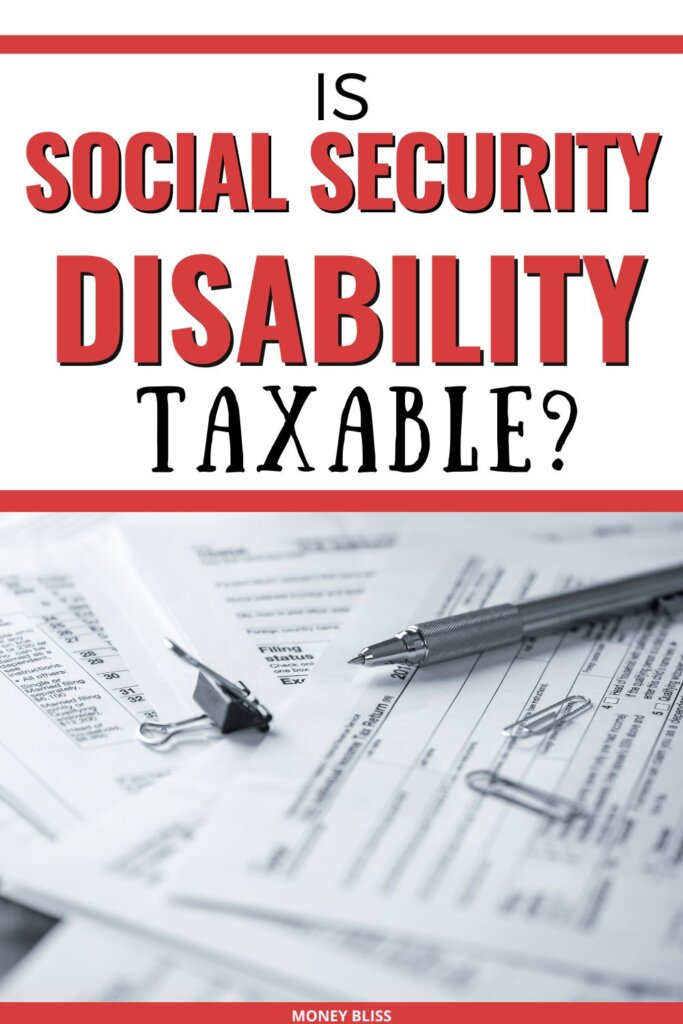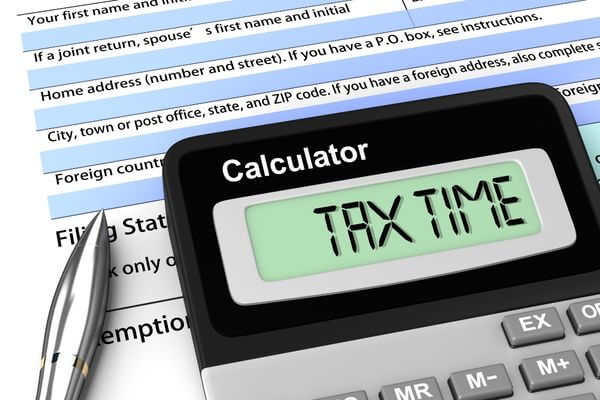Is Social Security Disability Income Taxable? How to Know for Sure
Inside: Do you have to file taxes on disability income? This guide will help you determine for sure if your income is taxable and how to file taxes when you receive Social Security Disability Income.
You’ve paid into Social Security your entire working life. Now that you are unable to work due to a disability, you can be approved for Social Security Disability income and expect to receive monthly payments.
But are those payments taxable?
I wondered the same thing when I was assigned the representative payee for a family member.
It’s an important question to ask because if they are taxable, it could have a significant impact on your overall tax bill.
Here’s what you need to know about whether or not Social Security disability income is taxable.

What is Social Security Disability?
Social Security Disability (SSDI) is a federal program offering monthly income to disabled American workers who have earned enough work credits and paid into Social Security.
To meet the Social Security Administration’s definition of disabled, those who qualify must have a severe and long-lasting medical condition that prevents them from performing the job duties they once did, and from doing any other type of work, making it impossible for them to earn a substantial income.
A disability must last for at least 12 months or be expected to last for that long. People who receive Social Security disability benefits due to a disability do not need to be of a certain age, they just need to meet the SSA’s standards.

What about SSI and Social Security Retirement Benefits?
Social Security Disability benefits are different from Supplemental Security Income (SSI) and Social Security retirement benefits.
- SSI is a needs-based benefit paid to those who are aged, blind, or disabled and have minimal to no income.
- Social Security retirement benefits are paid out based on past earnings, regardless of disability status.
Do you have to file taxes on disability income?

Yes, you should file an income tax return for your disability benefits.
Depending on your individual circumstances, including your overall income and filing status, you may have to pay federal taxes on your Social Security disability benefits.
- If you file a federal tax return as an individual and your total income is more than $25,000, or if you are filing jointly and you and your spouse have a total income of more than $32,000, you must pay federal taxes on your Social Security disability benefits.
- However, if your Social Security Disability and/or Supplemental Security Income (SSI) benefits are your only source of income, you may not have to file a federal income tax return.
It is important to note that you may still have to pay state and local taxes even if you do not have to pay federal taxes.
This post may contain affiliate links, which helps us to continue providing relevant content and we receive a small commission at no cost to you. As an Amazon Associate, I earn from qualifying purchases. Please read the full disclosure here.
TurboTax® is the #1 best-selling tax preparation software to file taxes online. Easily file federal and state income tax returns with 100% accuracy.
This is how I have filed my personal taxes for many years.
What are the income thresholds for Social Security Disability Income taxation?

The income thresholds for Social Security Disability Income (SSDI) taxation vary depending on your filing status and annual income.
SINGLE FILING STATUS
| Amount of Monthly Income | Amount of Annual Income | Maximum Portion of SSDI to Be Taxed |
| 0 – $2,083 | 0 – $25,000 | 0% |
| $2,084 – $2,833 | $25,000 – $34,000 | 50% |
| $2,834 and up | over $25,000 | 85% |
MARRIED FILING STATUS
| Amount of Monthly Income | Amount of Annual Income | Maximum Portion of SSDI to Be Taxed |
| 0 – $2,666 | 0 – $32,000 | 0% |
| $2,667 – $3,666 | $32,000 – $44,000 | 50% |
| $3,667 and up | over $44,000 | 85% |
However, the percentage of taxable benefits is subject to a maximum amount, so it is important to look at the graph provided to understand how much you may be required to pay.
How much of your Social Security disability income is taxable?

Are you wondering how much of your Social Security disability income is taxable?
Depending on your total household income, you may end up having to pay taxes on your SSDI benefits.
Here’s a step-by-step guide to help you figure out how much of your Social Security disability income is taxable.
Step 1: Calculate your total household income
First, you’ll need to determine your total household income.
This includes income from all types of income sources, such as wages, investments, dividends, and Social Security disability benefits.
If you are married, you’ll also need to include your spouse’s income.
Also, learn how to file taxes without W2.
Step 2: Determine your filing status
The next step is to determine your filing status.
- If you and your spouse file a joint return, your filing status is “married filing jointly.”
- If you and your spouse file separate returns, your filing status is “married filing separately.”
- If you are single, your filing status is “single.”
Step 3: Calculate your taxable SSDI income

Once you’ve determined your total household income and filing status, you can calculate how much of your Social Security disability income is taxable.
- For single filers, up to 50% of your Social Security disability benefits are taxable if your income is between $25,000 and $34,000. If your income is over $34,000, up to 85% of your SSDI benefits are taxable.
- For married couples filing jointly, up to 50% of your Social Security disability benefits are taxable if your combined income is between $32,000 and $44,000. If your combined income is over $44,000, up to 85% of your SSDI benefits are taxable.
Social Security Disability Taxable Example:
For example, let’s say you’re a single filer with a total household income of $30,000 and you receive $10,000 in Social Security disability benefits.
In this case, 50% of your benefits (or $5,000) would be taxable.
Knowing how much of your Social Security disability income is taxable can help you plan for taxes when you receive your benefits.
If you have questions, it’s best to consult with a tax professional.
How do I file taxes when I receive Social Security Disability Income?

Filing taxes can sometimes be confusing, especially if you are receiving Social Security disability income.
If you receive Social Security Disability Income (SSDI), you may need to file an individual income tax return and report it on your federal taxes.
So, here are two options on how to do so:
Option #1: Filing Taxes With Turbotax
Fortunately, TurboTax is here to help guide you through the process.
Here are the steps for filing taxes with TurboTax:
- Go to the TurboTax website and choose the free edition if you qualify.
- Create a TurboTax account and log in.
- Answer the questions TurboTax asks about your life.
- Report your SSDI: When filing your tax returns, you need to report disability benefits in Box 5 of Form SSA-1099, Social Security Benefit Statement. The Social Security Administration mails this form out to you each year.
- After completing all of the guided steps within Turbotax, see if you are due a refund.
- File your taxes. Many times, if your income is zero, you are not able to e-file. As such, download your forms to print and mail in your tax forms.
Once you have followed these steps, you should have a better understanding of how your SSDI is reported on your federal tax return and the taxes that you may need to pay on your SSDI income.
Option #2: Find a No Cost Clinic
Thankfully, there are plenty of programs to help you file taxes.
If you are overwhelmed about filing online, then find one of these resources.
Personally, I found working with a local college’s taxation department to be the case scenario. These tax students are able to get hands-on experience while you get help filing your taxes (and maybe even back taxes) for free.
TurboTax® is the #1 best-selling tax preparation software to file taxes online. Easily file federal and state income tax returns with 100% accuracy.
This is how I have filed my personal taxes for many years.
FAQ
What is the Status of Your Tax Picture?

In conclusion, whether or not you have to pay taxes on your Social Security Disability benefits depends on a number of factors.
You need to refer to the table to see if your Social Security Disability above to see if your benefits are taxable.
While you may not need to file taxes, you can still choose to file taxes.
A common question is do I need to file taxes with no income.
For us, when a family member received SSDI, we thought it was a clean slate to file taxes each year.
If you have any questions, it’s always best to consult with a tax professional to ensure you’re in compliance with the law.
Did the post resonate with you?
More importantly, did I answer the questions you have about this topic? Let me know in the comments if I can help in some other way!
Your comments are not just welcomed; they’re an integral part of our community. Let’s continue the conversation and explore how these ideas align with your journey towards Money Bliss.



